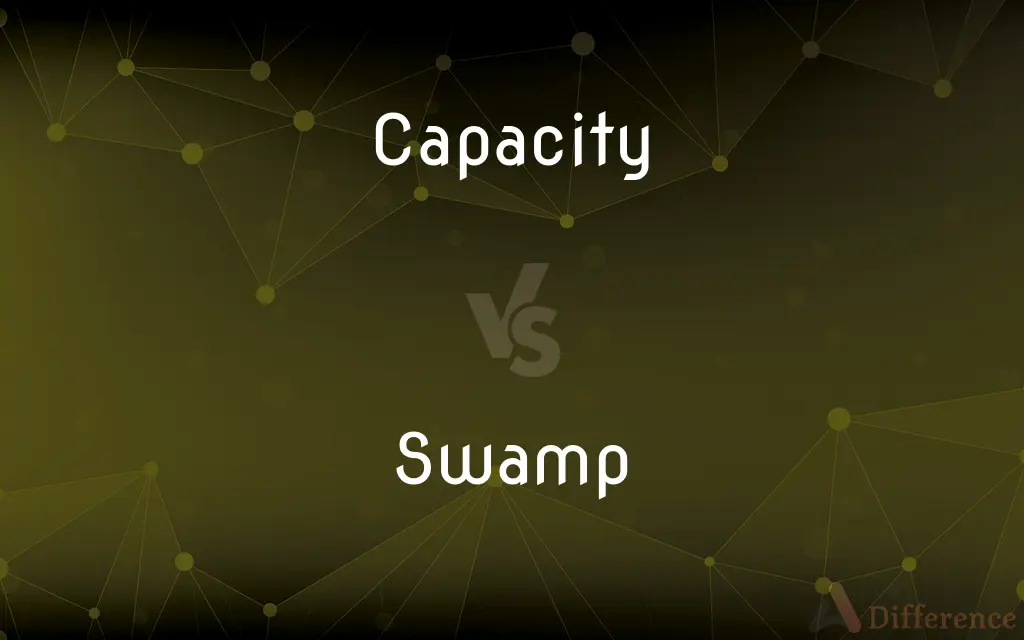Capacity vs. Swamp — What's the Difference?
By Fiza Rafique & Urooj Arif — Updated on April 9, 2024
Capacity refers to the maximum amount that something can contain or produce, while swamp is a wetland ecosystem characterized by waterlogged ground and diverse plant life.

Difference Between Capacity and Swamp
Table of Contents
ADVERTISEMENT
Key Differences
Capacity is a term often used to describe the maximum amount of something—whether it be the volume something can hold, the number of people a venue can accommodate, or the limit of one's abilities or resources. In contrast, a swamp is a specific type of natural environment, notable for its saturated soil and the presence of water-tolerant vegetation.
While capacity can apply to a wide range of contexts, including physical spaces, mental abilities, and production capabilities, a swamp is exclusively a geographical and ecological term, referring to areas with specific water saturation levels and ecosystems. Capacity highlights limits and potential, whereas swamp describes a habitat with particular ecological characteristics.
Capacity often involves measurements and quantifiable data to determine how much of something can be accommodated or achieved. Swamps, on the other hand, are characterized by qualitative descriptions of their ecological components, such as the types of vegetation, water levels, and animal inhabitants.
The concept of capacity can be applied to improve efficiency, enhance performance, or manage resources in various fields like engineering, psychology, and business. Swamps play crucial roles in the environment by providing habitats for wildlife, acting as natural water filtration systems, and contributing to global carbon storage, emphasizing their ecological importance rather than a quantitative limit.
Despite their vastly different meanings, the only potential overlap between the terms occurs in metaphorical language, where one might say a system is "swamped" to imply it has exceeded its capacity to handle tasks or information effectively. This figurative use underscores the capacity's focus on limitations and swamp's association with overwhelming conditions.
ADVERTISEMENT
Comparison Chart
Definition
The maximum amount something can contain or accomplish.
A wetland ecosystem with waterlogged soil and dense plant life.
Context
Broad, applicable to physical, mental, and production realms.
Geographical, ecological.
Key Focus
Limitations, potential.
Ecology, habitat characteristics.
Measurement
Quantitative (volume, number, ability).
Qualitative (types of vegetation, water levels).
Importance
Efficiency, performance, resource management.
Biodiversity, water filtration, carbon storage.
Compare with Definitions
Capacity
Maximum volume.
The tank's capacity is 500 gallons.
Swamp
Wetland ecosystem.
The Everglades is a famous swamp in Florida.
Capacity
Seating arrangement.
The auditorium has a seating capacity of 200.
Swamp
Waterlogged soil.
Swamps are characterized by their permanently waterlogged soil.
Capacity
Mental capability.
Learning new languages increases cognitive capacity.
Swamp
Diverse plant life.
Swamps are home to a variety of water-tolerant plants.
Capacity
Production limit.
The factory's production capacity was reached in November.
Swamp
Wildlife habitat.
Swamps provide crucial habitats for many species of birds and reptiles.
Capacity
Resource management.
Efficient resource management optimizes capacity utilization.
Swamp
Environmental role.
Swamps play an important role in natural water filtration and carbon storage.
Capacity
The ability to receive, hold, or absorb something
The storage capacity of a car's trunk.
Swamp
A swamp is a forested wetland. Swamps are considered to be transition zones because both land and water play a role in creating this environment.
Capacity
The maximum amount that can be contained
A bin filled to capacity.
Swamp
An area of low-lying land that is frequently flooded, especially one dominated by woody plants.
Capacity
The power to learn or retain knowledge; mental ability.
Swamp
A lowland region saturated with water.
Capacity
The ability to do, make, or accomplish something; capability
A comedian's capacity for making people laugh.
Swamp
A situation or place fraught with difficulties and imponderables
A financial swamp.
Capacity
The maximum or optimum amount that can be produced
Factories operating below capacity.
Swamp
To drench in or cover with or as if with water.
Capacity
The quality of being suitable for or receptive to specified treatment
The capacity of elastic to be stretched.
Swamp
To inundate or burden; overwhelm
She was swamped with work.
Capacity
The position in which one functions; role
In your capacity as sales manager.
Swamp
(Nautical) To fill (a ship or boat) with water to the point of sinking it.
Capacity
Legal qualification or authority
The capacity to make an arrest.
Swamp
To become full of water or sink.
Capacity
(Electricity) Capacitance.
Swamp
A piece of wet, spongy land; low ground saturated with water; soft, wet ground which may have a growth of certain kinds of trees, but is unfit for agricultural or pastoral purposes.
Capacity
Filling a space with the most it can hold
A capacity crowd at the concert.
Swamp
A type of wetland that stretches for vast distances, and is home to many creatures which have adapted specifically to that environment.
Capacity
The ability to hold, receive, or absorb
Swamp
(figurative) A place or situation that is foul or where progress is difficult.
Capacity
A measure of such ability; volume
Swamp
To drench or fill with water.
The boat was swamped in the storm.
Capacity
The maximum amount that can be held
It was hauling a capacity load.
The orchestra played to a capacity crowd.
A factory operating at less than full capacity.
Swamp
(figurative) To overwhelm; to make too busy, or overrun the capacity of.
I have been swamped with paperwork ever since they started using the new system.
Capacity
Capability; the ability to perform some task
Swamp
(figurative) To plunge into difficulties and perils; to overwhelm; to ruin; to wreck.
Capacity
The maximum that can be produced.
Swamp
Wet, spongy land; soft, low ground saturated with water, but not usually covered with it; marshy ground away from the seashore.
Gray swamps and pools, waste places of the hern.
A swamp differs from a bog and a marsh in producing trees and shrubs, while the latter produce only herbage, plants, and mosses.
Capacity
Mental ability; the power to learn
Swamp
To plunge or sink into a swamp.
Capacity
A faculty; the potential for growth and development
Swamp
To cause (a boat) to become filled with water; to capsize or sink by whelming with water.
Capacity
A role; the position in which one functions
Swamp
Fig.: To plunge into difficulties and perils; to overwhelm; to ruin; to wreck.
The Whig majority of the house of Lords was swamped by the creation of twelve Tory peers.
Having swamped himself in following the ignis fatuus of a theory.
Capacity
Legal authority (to make an arrest for example)
Swamp
To sink or stick in a swamp; figuratively, to become involved in insuperable difficulties.
Capacity
Electrical capacitance.
Swamp
To become filled with water, as a boat; to founder; to capsize or sink; figuratively, to be ruined; to be wrecked.
Capacity
(operations) The maximum that can be produced on a machine or in a facility or group.
Its capacity rating was 150 tons per hour, but its actual maximum capacity was 200 tons per hour.
Swamp
Low land that is seasonally flooded; has more woody plants than a marsh and better drainage than a bog
Capacity
Filling the allotted space.
There will be a capacity crowd at Busch stadium for the sixth game.
Swamp
A situation fraught with difficulties and imponderables;
He was trapped in a medical swamp
Capacity
The power of receiving or containing; extent of room or space; passive power; - used in reference to physical things.
Had our great palace the capacityTo camp this host, we all would sup together.
The capacity of the exhausted cylinder.
Swamp
Drench or submerge or be drenched or submerged;
The tsunami swamped every boat in the harbor
Capacity
The power of receiving and holding ideas, knowledge, etc.; the comprehensiveness of the mind; the receptive faculty; capability of understanding or feeling.
Capacity is now properly limited to these [the mere passive operations of the mind]; its primary signification, which is literally room for, as well as its employment, favors this; although it can not be denied that there are examples of its usage in an active sense.
Swamp
Fill quickly beyond capacity; as with a liquid;
The basement was inundated after the storm
The images flooded his mind
Capacity
Ability; power pertaining to, or resulting from, the possession of strength, wealth, or talent; possibility of being or of doing.
The capacity of blessing the people.
A cause with such capacities endued.
Capacity
Outward condition or circumstances; occupation; profession; character; position; as, to work in the capacity of a mason or a carpenter.
Capacity
Legal or moral qualification, as of age, residence, character, etc., necessary for certain purposes, as for holding office, for marrying, for making contracts, wills, etc.; legal power or right; competency.
Capacity
Ability to perform or produce
Capacity
The susceptibility of something to a particular treatment;
The capability of a metal to be fused
Capacity
The amount that can be contained;
The gas tank has a capacity of 12 gallons
Capacity
The maximum production possible;
The plant is working at 80 per cent capacity
Capacity
A specified function;
He was employed in the capacity of director
He should be retained in his present capacity at a higher salary
Capacity
(computer science) the amount of information (in bytes) that can be stored on a disk drive;
The capacity of a hard disk drive is usually expressed in megabytes
Capacity
An electrical phenomenon whereby an electric charge is stored
Capacity
The power to learn or retain knowledge; in law, the ability to understand the facts and significance of your behavior
Capacity
Tolerance for alcohol;
He had drunk beyond his capacity
Common Curiosities
What defines a swamp?
A swamp is defined by its waterlogged soil and the presence of specific plants and animals adapted to its wet conditions.
What is capacity?
Capacity refers to the maximum amount something can hold, produce, or achieve.
How does one increase capacity?
Increasing capacity can involve physical expansion, enhancing skills or knowledge, or improving efficiency through technology or methods.
What ecological roles do swamps play?
Swamps contribute to biodiversity, act as natural water filtration systems, and help in carbon storage.
Is the capacity of a swamp measurable?
While the capacity of a swamp isn't typically discussed in those terms, aspects like water volume and carbon storage can be quantified.
How is capacity measured?
Capacity is measured in quantitative terms, such as volume, numbers, or performance levels.
Can capacity apply to natural ecosystems like swamps?
While capacity typically refers to limits and potential in various contexts, swamps are defined by their ecological characteristics rather than by capacity. However, the term can be metaphorically used to describe ecosystems overwhelmed by environmental stress.
Can swamps be restored if damaged?
Yes, through conservation efforts and ecological restoration projects, damaged swamps can often be restored to improve biodiversity and ecological function.
What happens when something exceeds its capacity?
Exceeding capacity can lead to inefficiency, system failure, or the need for expansion or adaptation.
How do capacity and swamp interact in environmental management?
In environmental management, managing the capacity of resources and understanding ecosystems like swamps are crucial for sustainability.
What metaphorical use does "swamped" have in relation to capacity?
"Swamped" is often used metaphorically to describe situations or systems that are overwhelmed or have exceeded their capacity to manage effectively.
Are all wetlands considered swamps?
Not all wetlands are swamps; wetlands include marshes, bogs, and fens, each with distinct characteristics.
Can technological advancements impact a swamp's ecology?
Yes, advancements and human activities can affect swamps, potentially leading to pollution, habitat destruction, or conservation efforts.
Why are swamps important to the environment?
Swamps play vital roles in supporting wildlife, regulating water quality, and contributing to climate regulation through carbon sequestration.
What challenges do swamps face?
Swamps face challenges such as pollution, drainage for agriculture, and climate change, all of which threaten their ecological balance.
Share Your Discovery

Previous Comparison
Seeps vs. Sees
Next Comparison
Consortia vs. ConsortiumAuthor Spotlight
Written by
Fiza RafiqueFiza Rafique is a skilled content writer at AskDifference.com, where she meticulously refines and enhances written pieces. Drawing from her vast editorial expertise, Fiza ensures clarity, accuracy, and precision in every article. Passionate about language, she continually seeks to elevate the quality of content for readers worldwide.
Co-written by
Urooj ArifUrooj is a skilled content writer at Ask Difference, known for her exceptional ability to simplify complex topics into engaging and informative content. With a passion for research and a flair for clear, concise writing, she consistently delivers articles that resonate with our diverse audience.












































